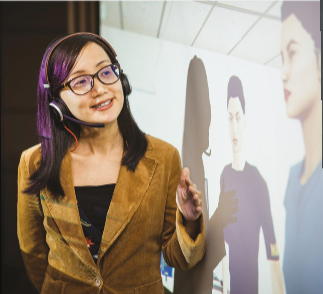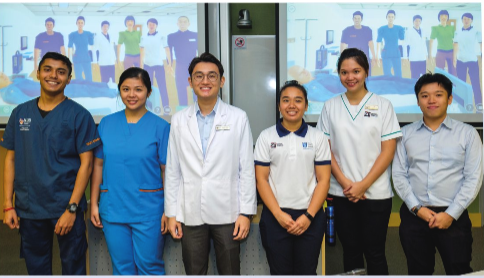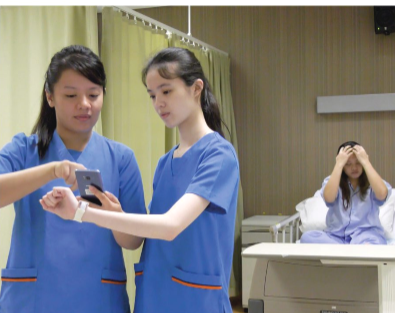When Singapore raised its coronavirus threat response to DORSCON Orange in February following assessed heightened risks, NUS healthcare students found their clinical attachments at the hospitals cancelled.

Toh Shao Wei’s initial reaction was one of anxiety. “I was afraid that my graduation was going to be delayed, said the then-Year 4 Nursing student about his nursing education.
He and his course-mates were ultimately able to complete their attachments by utilising some clinical hours in a virtual simulation program called CREATIVE.
The tool allows students from six disciplines – Medicine, Nursing, Physiotherapy, Occupational Therapy, Pharmacy and Social Work – to interact with each other as avatars around a virtual patient, discussing their assessment of his condition and collaborating on his care.
So amid the disruption that a global pandemic wrought on education systems everywhere, Shao Wei had a safe environment to practise his communication skills and improve his assessment and confidence levels, without the usual constraints on location, time and manpower.
It sounds like science fiction, but NUS Nursing and Associate Professor Liaw Sok Ying, the project’s principal investigator, are set to implement CREATIVE in AY2020 to an initial cohort of about 600 Year 3 Medicine and Nursing students. It will form part of their inter-professional learning curriculum.
USING TECHNOLOGY TO ENHANCE NURSING EDUCATION
Virtual simulation is just one of three pillars currently underpinning the latest in technologies that NUS Nursing has successfully tested and will be incorporating into its four-year undergraduate curriculum in the upcoming academic year.
Rounding up the high tech list are an artificial intelligence tool that teaches Nursing students to communicate with virtual patients, and an augmented reality program used as an interactive teaching tool for students to understand mental health symptoms.
The technologies will be used throughout the span of a student’s years in Nursing school and seek specifically to improve inter-professional collaboration and multi-disciplinary team care, soft skills such as communicating and listening, as well as mental health nursing – all deemed core competencies of a nurse.

NUS Nursing sees these additions to nursing education as complementary to traditional classroom learning, actual lab simulation and patient sessions.
“They bring realism and authentic scenarios to learning. Technology-enhanced training may also further bridge the theory and practice gap and help our students transition to practice more seamlessly,” said Professor Emily Ang, Head of NUS Nursing.
Moreover, the addition of more immersive and interactive training is expected to help deepen student engagement among digital natives, some of who may benefit more effectively from experiences outside of e-lectures and instruction videos.
“These technologies also allow us to scale to make learning more accessible to our increasing undergraduate base, making learning anywhere, anytime, possible,” said Prof Ang.
NUS Nursing enrolls over 360 students in its undergraduate and post-graduate programmes yearly.
In 2006 when it started Singapore’s first local undergraduate Nursing degree programme, 49 students signed up.

CREATIVE: VIRTUAL SIMULATION TO TEACH COLLABORATION AND TEAM-BASED CARE
Work on this technology started in 2017 when a team of educators from the National University of Singapore, Nanyang Polytechnic and the Singapore Institute of Technology sought to solve the lack of Inter-professional Education (IPE, activities across tertiary institutions and healthcare students.
A study conducted that year showed that students who participated in virtual simulation tests reported an improvement in their attitudes towards IPE. They also positively perceived the use of the virtual platform in supporting social interaction and collaborative learning among different healthcare professions, and could see the feasibility of taking on this mode of learning from their homes.
A three-armed randomised controlled trial (RCT) conducted on 207 students from the six healthcare courses further supported the use of virtual simulation in optimising teamwork.
Another RCT study in July and August 2018 with 120 Medical and Nursing undergraduate students showed that virtual simulation may be as effective as “live” simulation in training teamwork and communication skills.
VCAAI: ARTIFICIAL INTELLIGENCE TO TEACH COMMUNICATION SKILLS
This program, which uses virtual patients to train Nursing students to improve their communication skills, has a voice chatbot learning system powered by Al. Students interact with the virtual patients through four case scenarios that were adapted from real-life clinical case studies.
Principal investigator Assistant Professor Shefaly Shorey tested the program on more than 300 Year 2 and Year 3 Nursing undergraduates. Her findings show the platform to be effective in raising student nurses’ confidence in communicating with real-life patients.
She plans to use the program as a teaching tool to train incoming batches of Nursing undergraduates.
Priyadharshni Rajendran, a Year 4 Nursing student, said the program empowered her to take charge of her own learning and progression as a student nurse, and turned her into a more independent learner under this new program of nursing education.
“VCAAI caters to the learning of all types of students. This is because the less vocal students who may not be as confident in interacting with the simulated patients may actually be able to try out the simulations in a more comfortable environment and gain confidence through practising using the VCAAI,” she added.
AUGMENT: USING AUGMENTED REALITY TO ENHANCE EMPATHY IN MENTAL HEALTH NURSING
This mobile application uses augmented reality as an interactive teaching pedagogy for students to better understand mental health symptoms while learning mental health nursing.
For example, the app allows students to experience symptoms patients encounter when they are having hallucinations, including auditory, visual and tactile experiences.
Dr Shawn Goh, the principal investigator for the project, plans to implement the app in AY2020 to all students taking the Year 2 Mental Health Nursing module.
This application will also be introduced to caregivers from two organisations, Ang Mo Kio Family Service Centre and Caregiver Alliance, to increase their understanding of mental health symptoms and promote empathy for people with mental health conditions in the community.


